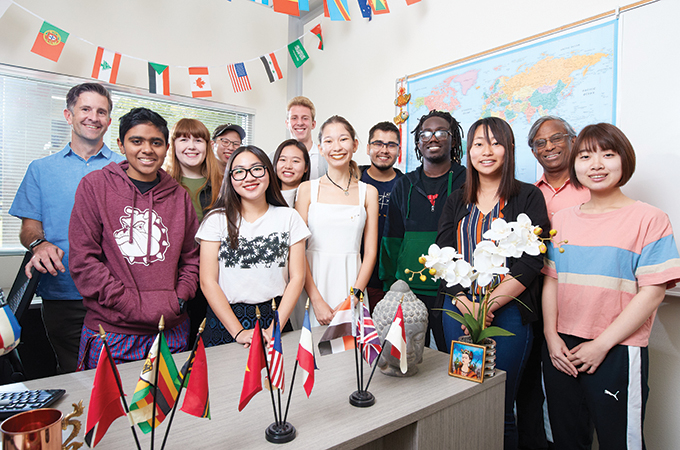Steve Wuhs, assistant provost for internationalization at the University of Redlands, spoke to Mika Elizabeth Ono of the Bulldog Blog and Och Tamale magazine about the campuswide summit held this spring and other developments enhancing the University’s global perspective.
Och Tamale: How do you describe internationalization at the University? Where have we been, and where are we going?
Steve Wuhs: We started consciously “internationalizing” in 2013, when Ralph Kuncl became president and set it as one of his priorities. However, as part of the new Council on Comprehensive Internationalization, we quickly realized the University was already very international in its curriculum and study abroad programs. International work is part of who we are. We are creating global citizens. So, in addition to improving and expanding our programs, part of the internationalization effort has been making what we have and what we’ve done more visible. The exception is international students: A decade ago, we weren’t actively recruiting international students, and they made up only half a percent of our student body. Now, we recruit internationally, the number of international students has increased eightfold, and we have resources dedicated to supporting them, including Rebecca Freeland of the Office of International Students and Scholars.
OT: How did you come to organize the internationalization summit in March?
Wuhs: When I was approached by a consulting program to advance internationalization at the University, I reviewed their goals and realized we were already doing what an external observer would recommend. We recognize faculty for their global work; offer majors and minors for students to pursue global interests; offer study abroad across the University; provide opportunities as pathways for students to move into international careers; and produce Fulbright scholars and Peace Corps volunteers. Internationalization is hardwired into Redlands because the faculty has viewed it as an essential part of a good education.
So the idea behind the summit was to tap the Redlands community on where to go from here. We reviewed what we had done in the past five years and set the agenda for the next five. How do we ensure students get the most out of their international experiences? How do we make sure these experiences are accessible? Every student should have a global experience while at the University—that’s my baseline commitment. They don’t have to leave campus for that, though. This year, we tried some online collaborations. We also recently signed a memo of understanding with a new partner in Mexico— Autonomous University of Baja California in Mexicali, just over the border—to enable short-term visits for students who can’t afford the airfare to Spain or who can’t take a semester away.
OT: What were some of the highlights?
Wuhs: Dean Andrew Wall spoke on unexpected successes and the importance of leadership. Five years ago, the School of Education was not actively pursuing internationalization. Now, faculty members are enthusiastic; they’ve introduced a curriculum requirement for a global experience, and they offer multiple study abroad courses every year. The School has established collaborative relationships in Haiti and Honduras, and is developing a new counseling program with the Oriental Institute in China.
Five students also spoke, giving wonderful accounts of the value of different kinds of global experiences. Sonia Gomez ’17, ’18 spoke about how study abroad in the School of Business changed how she saw the world and how she is raising her daughter. Fernando Martinez ’19, who was in my Mexican Politics class, which is delivered in Spanish, talked about how the class made him prouder of being Mexican and bilingual. It was touching and unexpected.
We also talked about the Residence Life living-learning community we call the Global Quarter, now in its third year. Students interested in international experiences, as well as some international students, live together and participate in internationally themed programs. The Global Quarter doubled in size this fall with the addition of Merriam Hall (for returning students) to North Hall (for first-year students). This expansion was a proposal from the summit.
OT: What else did you hear from participants?
Wuhs: There was support for continued “language across the curriculum” efforts, which use a language other than English as the medium for a course. For example, Professor Munro Galloway recently taught a class on French art in French. These classes give students the ability to practice and refine language skills they’ve developed in our language programs, as heritage speakers, or through study abroad; students are also able to connect language skills to professional development.
Similarly, a multilingual translation/interpretation course has been taught by Jennifer de la Cruz, head of interpreting services at the San Bernardino County courthouse. The class focuses on the techniques of interpretation and translation with some information on translation careers. Last year, the class included students whose second languages were French, Spanish, Mandarin, and Arabic. This year, there’s Spanish, Korean, Vietnamese, and Japanese. It is fun to see students excited about exploring the cultural differences that the act of interpretation reveals.
These courses were paid for by an innovation grant from the University. I’m hopeful these classes will continue, although we need to work toward sustainability in terms of resources and faculty time. Other ideas from the summit included developing certificates in intercultural competency, introducing minors that integrate language and culture, and ensuring students’ schedules enable participation in semester-long study abroad.
OT: For you, what was the best part of the summit?
Wuhs: Everyone was at the table: Student Affairs, Advancement, Enrollment, faculty, the deans, the president, the provost, our international student advisors. I appreciate how we think about internationalization here in an integrated way. All of our efforts—the curricula, study abroad, international students, and even fundraising and communications—are bound together, more so because we’re a small school. We have common underlying goals.
Learn more about global opportunities at the University of Redlands.






